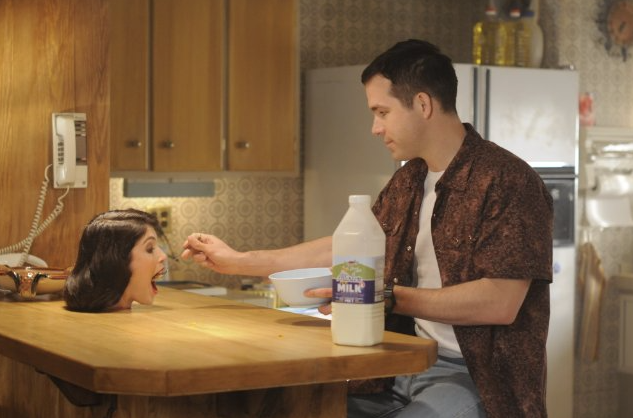“The Voices” wickedly futile and wholly original
“The Voices”
February 16, 2015
Simultaneously gruesome, surreal, quirky and hilarious, “The Voices” is an unwanted horror comedy offspring at the Sundance Film Festival circuit and a ready-made cult classic. Directed by Marjane Satrapi, Ryan Reynolds returns to the spotlight as Jerry, the lovable dork that hears voices in his head. Aided by his malicious cat and sympathetic dog, Jerry pursues his office crush Fiona, played by Gemma Arterton, and inadvertently winds up a murderer. Jumping between normalcy and lunacy, “The Voices” offers a sensationally hollow look inside the fantastical mind of a serial killer.
Jerry works as a packager in a small town’s fixture and faucet manufacturing company under the guidance of his court-appointed psychiatrist Dr. Warren played by Jacki Weaver. While working up the nerve to ask Fiona on a date, Jerry’s secret home life remains a mess.
“In her eyes you’re a ridiculous peasant,” hisses Mr. Whiskers, Jerry’s talking cat. Refusing to take his meds, Jerry’s pets—cleverly voiced by himself—berate and reassure him, forwarding the plot and complicating Jerry’s dumbly sweet exterior.
A chance encounter with Fiona on a dark and stormy night gives Jerry some pretext to open up with a well-meaning joke about the angels he hears talking to him. Unfortunately for Fiona, the demented punch line is her inadvertent demise. Confused and scared, Jerry turns to the menacing Mr. Whiskers who naturally urges him to hide the body and pursue his killer instincts. Jerry neatly stores the body in a stack of color-coded Tupperware containers, wipes the blood off the finishing container to his even tower of dismembered parts and sighs with relief. Fiona’s head is stored in the fridge for safekeeping, but the moment the door closes, Fiona comes to life, shaming Jerry into taking his pills.
Satrapi as a director is better known for her personal graphic novel “Persepolis: The Story of a Childhood,” and she draws the cartoonish style into the film with a foreign but enticing vision. Satrapi’s detachment from the American setting adds more charm to the film than it takes away. Quirky symmetry pervades the town, Pepto-Bismol-pink jumpsuits are home in the equally pink warehouse, a back alley Chinese dive restaurant is complete with an Elvis Presley impersonator and Jerry’s own apartment is part of a larger abandoned bowling alley alive with pink and blue neon lights.
The apartment’s interior is clean, lively and held in soft focus. The walls are vibrant, but as soon as the pills pass Jerry’s lips, the colors wash away. The stark contrast of reality is like a lifted curtain: the apartment is laden with trash and animal feces, and the once talkative Fiona becomes nothing more than a messy pile of gore and slack-jawed dismembered head. Lonely and horrified, Jerry washes the pills down the sink.
For Jerry, the comforting fantasy takes precedence over dull sanity. He opens the fridge to a bright “Hello, Jerry!” and the voices coax him back into a world of terrible beauty. Now empowered, he plots to bring more dismembered “friends” to his home, starting with another coworker, Lisa, played by Anna Kendrick.
His mind rebelling against him, Jerry still manages to wrap himself around the hallucinations. Understanding that they are byproducts of his mind, his very personable and gentle self operates in a sympathetic light to the audience. Reynolds’ acting carries the movie through abrupt twists and disturbing visuals with the utmost grace as the awkward Jerry. Channeling his own quiet and shy childhood, Reynolds manages to create the enigmatic Jerry and give depth to a simple concept.
“The Voices” loses itself in its own world as the climax nears, constantly trying to top its already strong fantasy-world gimmick. Rebounding between fantasy and reality one too many times, the film crashes and burns into a comically weird finale. The ending makes sense given the outspoken tone of the film but still comes as an all-encompassing thematic disappointment.
The film is still a promising step forward in Satrapi’s directing path and a fundamental mark in Reynolds’ career. Featuring a stunning performance and an engrossing ride, “The Voices” takes an original and lighthearted stab at mental illness with a striking and distinct voice of its own.








